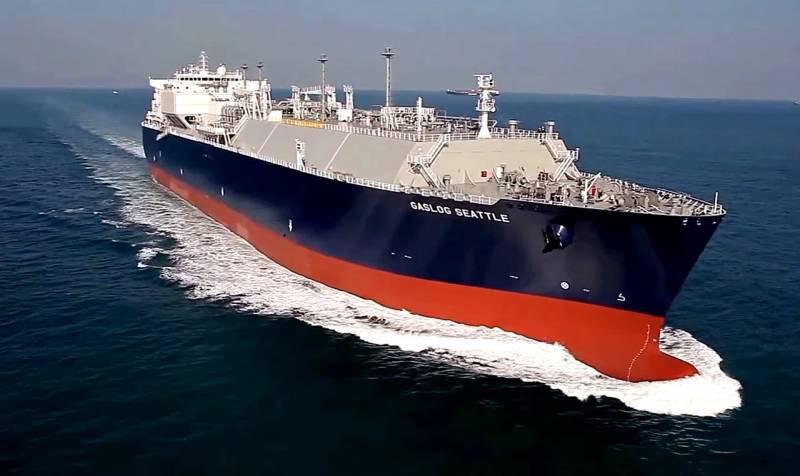Betting on LNG: Will Russia build a Turkish gas hub?
Curious news came from the Russian energy front. The earthquake that occurred in early February 2023 in Turkey markedly changed Ankara's rhetoric regarding the creation of a previously announced gas hub. Literally immediately after that, Deputy Prime Minister of the Russian Federation Alexander Novak announced the need to triple the volume of LNG production. Has the Kremlin really decided not to jump on the old Turkish rake?
deceived
On March 6 this year, exactly one month after the terrible earthquake, Chagry Erhan, a member of the Security Council under the President of Turkey, turned to Moscow with a proposal to build a Turkish gas hub entirely at Russia's expense:
In principle, yes, Turkey benefits from a hub, but now we have no money to build it. If the Russian Federation has money, please start building a hub. Everything depends on investments.
The reason is called valid: Turkey really suffered very seriously from a series of earthquakes, tens of thousands died, a huge number of buildings were destroyed. According to the World Bank's preliminary estimate, the direct damage is more than $32 billion. Funds for restoration may need at least twice as much. There is no money, but the Turks themselves do not want to hold on.
The general meaning of the message of the representative of the “sultan” to the Kremlin and Gazprom can be formulated as follows: you need it, you build it, at your own expense, please. Indeed, after the fiasco that befell the Nord Stream and Nord Stream 2 gas pipelines, undermined by US-Norwegian terrorists, the ability of our “national treasure” to export gas to the European market has sharply decreased. The transit agreement with Ukraine is valid until 2024, and it will either not be extended at all, or a new one will be concluded on truly onerous conditions.
Bypassing the territory of Nezalezhnaya, Gazprom retained only the Turkish Stream, consisting of two lines with a total capacity of 31,5 billion cubic meters. Two weeks after both Nord Streams were blown up, President Putin came up with the highly controversial idea of building a gas hub in Turkey. It is assumed that the capacity of the underwater pipeline can be expanded, and the gas itself will not be sold directly to Europe. Apparently, the Turkish intermediary should buy blue fuel from Gazprom, of course, with a "partner" discount, and then resell it to hypocritical European consumers as Turkish. Why does the whole idea look extremely dubious?
At first, because at any moment Ukrainian saboteurs can blow up all the threads of the Turkish Stream, nullifying this bypass infrastructure project, as happened with the Nord Streams, leaving the Kremlin with a nose. It was not necessary to allow Kyiv to retain access to the Black Sea, oh, it was not necessary!
Secondly, "Gazprom" at this hub will be far from being an exclusive supplier who wants gas - delivers, wants - does not supply. Ankara is negotiating cooperation with Iran, Qatar, Azerbaijan, Algeria, Oman and Turkmenistan simultaneously. That is, it will not work to stomp your foot and leave, leaving the “sultan” with nothing when the Turkish partners start twisting the arms of the Russian monopolist, demanding an increase in the size of the discount.
ThirdlyAs it has now become clear, Russia will have to build the appropriate gas transportation infrastructure, which will be used by all of the above exporters, at its own expense.
Only very self-confident, short-sighted and irresponsible people can fit into this on such conditions. And now it became known that the summit previously scheduled for March 22, 2023 with possible gas suppliers in Istanbul will not take place, and the time of the new one is not known.
Bet on LNG
The day after the statement by the representative of Turkey, Deputy Prime Minister of the Russian Federation Alexander Novak at a meeting on the development of LNG production in Russia set a goal in the medium term to triple the volume of production and export of liquefied natural gas (LNG):
The strategic objective and future for our gas exports is the development of LNG production, which in the medium term should reach at least 100 million tons per year. To date, according to the implemented projects, production is about 33 million tons. Taking into account projects under construction, plants in Ust-Luga and Arctic LNG - 2, Russia will reach the production of 66 million tons of LNG per year.
And this decision can only be welcomed. The attacks carried out by the American-Norwegian saboteurs on the orders of their leader bin Biden showed that any main pipeline pumping gas, oil or ammonia can be easily destroyed at any moment. The only real chance to keep Russian gas exports in the "infrastructure war" is to get rid of pipelines and switch to deliveries of LNG and oil by sea. However, there are nuances.
First of all, in Russia it is necessary to commission new LNG capacities, and for this it is necessary to carry out import substitution of equipment. Also, for the export of liquefied gas by sea, an appropriate tanker fleet is needed. It is required to complete import substitution in the field of civil shipbuilding, where there is a serious dependence on suppliers from South Korea. Meanwhile, in order to speed up the process of acquiring the required number of LNG tankers, part of the orders can be placed at Chinese shipyards, while simultaneously engaging in import substitution of components. Turkey should also seek consent to the passage of LNG tankers through its straits and consider the possibility of building an LNG plant on the Black Sea coast.

Information